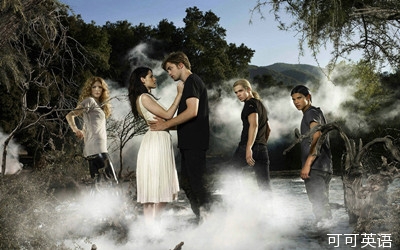"Wow."
“哇噢。”
"You like it?" He smiled.
“你喜歡?”他笑了起來(lái)。
"It… has a certain charm."
“這……實(shí)在太有吸引力了。”
He pulled the end of my ponytail and chuckled.
他拉了一下我的馬尾的末梢,輕笑起來(lái)。
"Ready?" he asked, opening my door.
“準(zhǔn)備好了嗎?”他問(wèn)道,打開(kāi)了我的車(chē)門(mén)。
"Not even a little bit — let's go." I tried to laugh, but it seemed to get stuck in my throat. I smoothed my hair nervously.
“一點(diǎn)也沒(méi)有——我們走吧。”我試圖大笑,但笑聲似乎卡在了我的喉嚨里。我不安地?fù)崞街约旱念^發(fā)。
"You look lovely." He took my hand easily, without thinking about it.
“你看上去很可愛(ài)。”他輕松地拉起我的手,完全不假思索。
We walked through the deep shade up to the porch. I knew he could feel my tension; his thumb rubbed soothing circles into the back of my hand.
我們穿過(guò)深邃的樹(shù)陰,向門(mén)廊走去。我知道他能感覺(jué)到我的不安,他的拇指在我的手背上打著圈,讓我鎮(zhèn)靜下來(lái)。
He opened the door for me.
他為我打開(kāi)了門(mén)。
The inside was even more surprising, less predictable, than the exterior. It was very bright, very open, and very large. This must have originally been several rooms, but the walls had been removed from most of the first floor to create one wide space. The back, south-facing wall had been entirely replaced with glass, and, beyond the shade of the cedars, the lawn stretched bare to the wide river. A massive curving staircase dominated the west side of the room. The walls, the high-beamed ceiling, the wooden floors, and the thick carpets were all varying shades of white.
屋里更加驚人,甚至比屋外還要出乎意料。屋里非常明亮,非常開(kāi)闊,非常寬敞。這里原本應(yīng)該有好幾個(gè)房間,但一層的大部分墻壁都被打通了,變成了一個(gè)尤為廣闊的空間。屋后面向南邊的墻壁被全部替換成整塊的玻璃,而在雪松的樹(shù)蔭之外,綿延著的草地上,一條寬廣的河流展露無(wú)遺。一座宏偉的回旋樓梯占據(jù)了房間的西面。墻面,高高聳起的天花板,木制的地板,厚重的地毯,全都是各種色調(diào)的白色。
Waiting to greet us, standing just to the left of the door, on a raised portion of the floor by a spectacular grand piano, were Edward's parents.
就站在門(mén)口的左邊,站在地板上一塊升高的部分,在一架巨大的平臺(tái)式鋼琴旁,等著招呼我們的,是愛(ài)德華的父母。

《暮光之城》
與圖書(shū)題目相得益彰的是,“暮光之城”系列別具匠心的封面設(shè)計(jì)則很好地傳達(dá)出了每本書(shū)內(nèi)在的深遠(yuǎn)寓意。斯蒂芬妮·梅爾指出《暮色》封面上的蘋(píng)果代表“創(chuàng)世紀(jì)” 內(nèi)善惡樹(shù)上的禁果。象征貝拉和愛(ài)德華之間人類與吸血鬼禁忌的愛(ài)戀。在書(shū)的開(kāi)頭引用了“創(chuàng)世紀(jì)”217頁(yè)的內(nèi)容:“只是分別善惡樹(shù)上的果子,你不可吃,因?yàn)槟愠缘娜兆颖囟ㄋ馈!边@同時(shí)也代表了貝拉如何分辨善惡——選擇是否吃下那顆禁忌的果實(shí),這比喻了選擇跟愛(ài)德華在一起或遠(yuǎn)離他。











